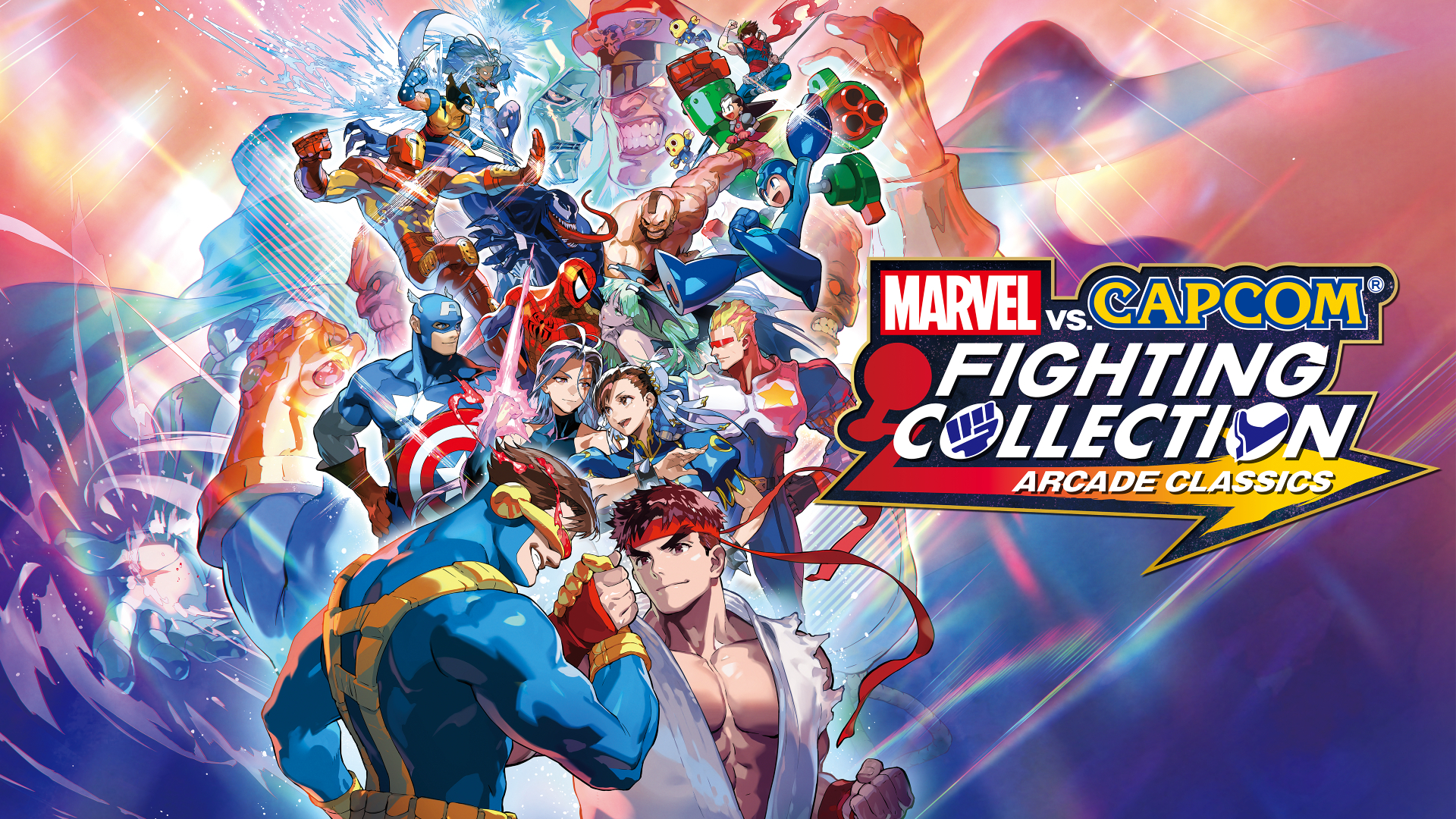TechRadar Verdict
For many, all Marvel vs. Capcom Fighting Collection: Arcade Classics needs to be is a functioning, accessible way to play some of Capcom’s most beloved classic fighting games on modern hardware. The great news is that this seven-game compilation is just that, with feature-complete arcade versions of each game fitted with all-new training modes as well as casual and ranked online play. Marvel vs. Capcom 2 is the clear star of the show, with quality varying between the other featured games, but all are worth checking out regardless.
Pros
- +
Capcom’s Marvel games finally available on modern hardware
- +
Plenty of options for display customization
- +
Addition of training mode for each game is fantastic
- +
Wonderful gallery content to peruse
Cons
- -
No Xbox version at launch
- -
As these are arcade ports, extra content is minimal
Why you can trust TechRadar
Platform reviewed: PC
Available on: PS4, Nintendo Switch, PC (Xbox version coming in 2025)
Release date: September 12, 2024
The fact that Marvel vs. Capcom Fighting Collection: Arcade Classics exists is a miracle - a veritable glitch in the timeline. After both companies seemingly burned its bridges after Marvel vs. Capcom Infinite’s disastrous reception, any kind of comeback for the Versus series became one of gaming’s white whales.
And yet here we are in 2024, with a brand new collection that makes seven Capcom-developed Marvel games available to play once again on modern consoles and PC. Sure, Marvel vs. Capcom 2: New Age of Heroes is handily the standout title here, but the other six games (some of which have never received console ports before) are plenty worth checking out for casual and curious players.
Those expecting a content-rich experience won’t find it here, though. These are your bread-and-butter arcade ports and thus lack any additions brought to various other console ports over the years. However, with casual and ranked online play support alongside in-depth training modes and music and image galleries, there’s plenty to enjoy if you want to pick up one of these fighting games for regular play.
Reality stone
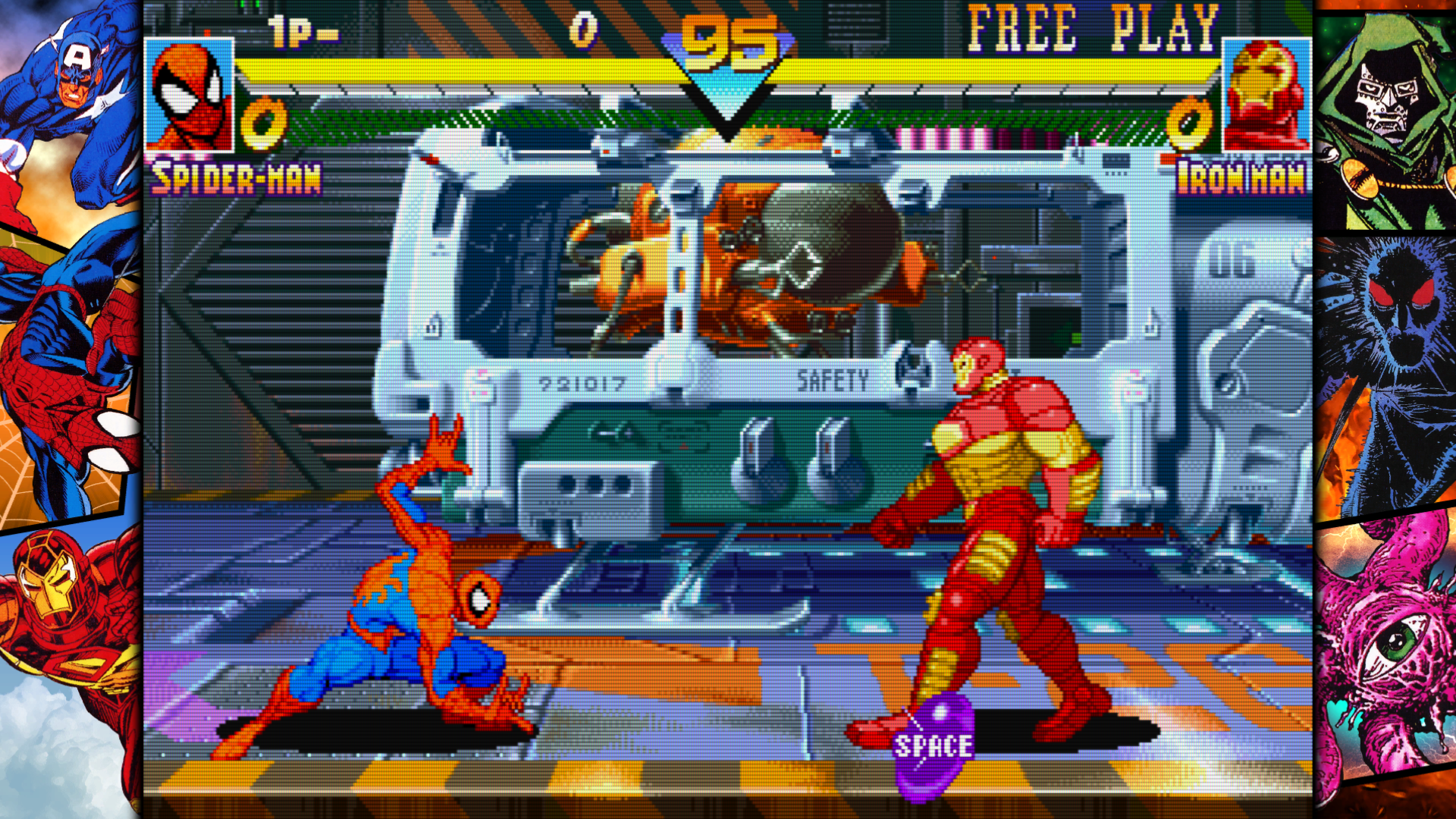
Marvel vs. Capcom Fighting Collection: Arcade Classics includes seven arcade titles, and they are as follows:
- X-Men: Children of the Atom (1994)
- Marvel Super Heroes (1996)
- X-Men vs. Street Fighter (1996)
- Marvel Super Heroes vs. Street Fighter (1997)
- Marvel vs. Capcom: Clash of Super Heroes (1998)
- Marvel vs. Capcom 2: New Age of Heroes (2000)
- The Punisher (1993)
The collection is available on Nintendo Switch, PlayStation 4 (and on PS5 via backwards compatibility) and PC. The initial omission of an Xbox announcement was puzzling to some, but Capcom has since confirmed it’ll be coming to Xbox One (and therefore Xbox Series X and Series S via backwards compatibility) sometime in 2025.
You might have noticed that one of the games in this collection isn’t like the others. The Punisher is a two-player beat ‘em up and released at a time when Capcom was arguably the king of the subgenre, launching around the same time as the Final Fight series, Dungeons & Dragons: Tower of Doom, and the legendary Alien vs. Predator. The Punisher beat ‘em up may not be as fondly remembered as other Capcom greats, but it’s well worth a playthrough or two here, especially if you can grab a buddy for a co-op session.
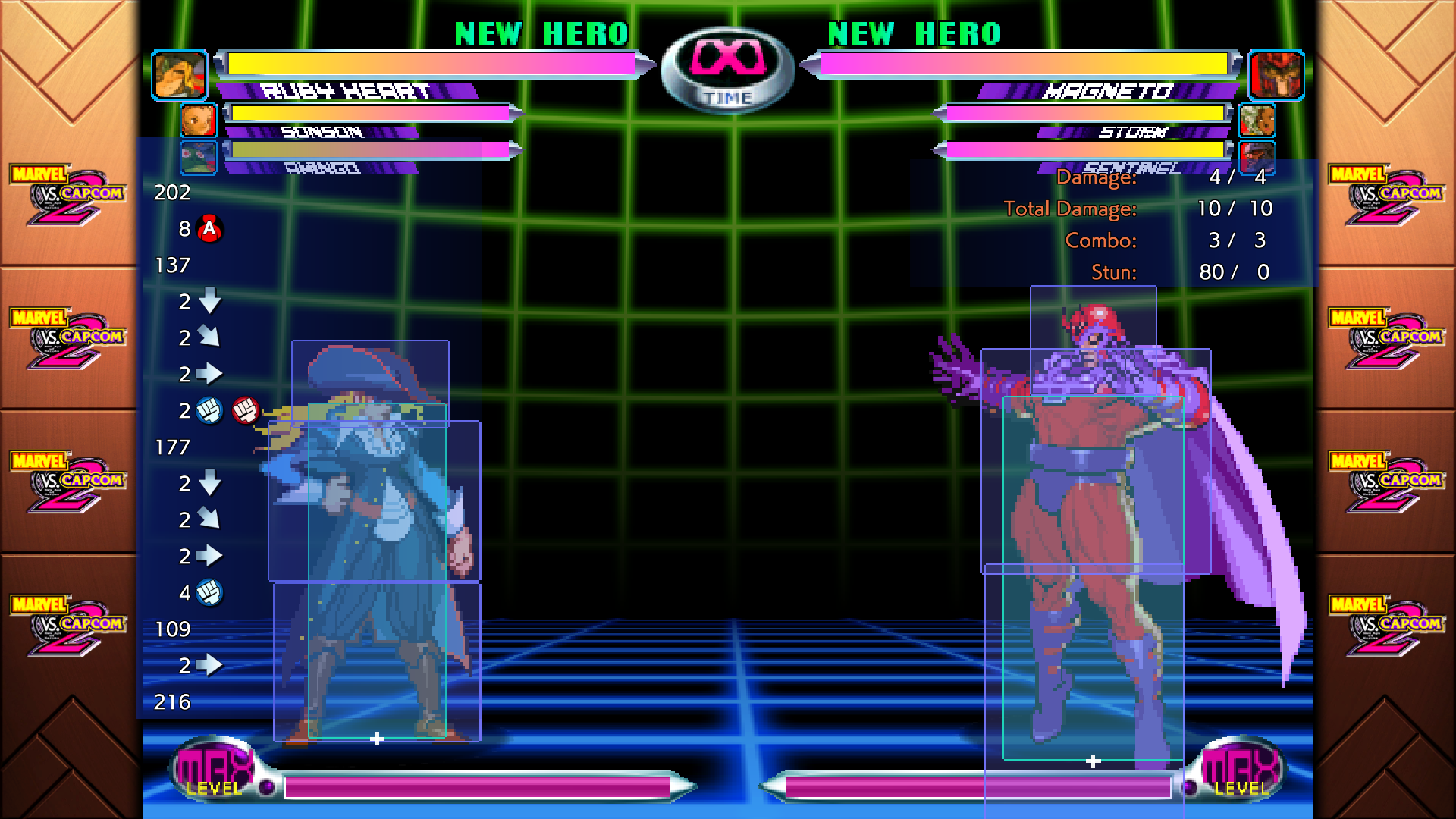
Marvel vs. Capcom 2: New Age of Heroes is the crown jewel of this collection. This 3-vs-3 team fighter features a colossal 56-character roster shared between iconic Marvel and Capcom representation. It’s not the most balanced fighter out there with a very clear set of top-tier (and low-tier) characters, but there’s so much fun to be had in its assist system that lets you tag in fighters for massive combo potential.
Then you have the run of fighting games from 1994’s X-Men: Children of the Atom to 1998’s Marvel vs. Capcom: Clash of Super Heroes. While Marvel vs. Capcom 2 may be the culmination of these games that came before it, I’d implore you not to write them off as novel curios here - especially as they offer plenty in terms of gorgeous visuals and compelling gameplay systems.
Sign up for breaking news, reviews, opinion, top tech deals, and more.
Marvel Super Heroes, for example, turns the iconic Infinity Gems into a gameplay mechanic. They drop into a match as collectible items and offer various buffs upon activation, such as increasing movement speed or adding projectiles to your attacks. Some characters also synergize with certain gems, offering unique abilities like Psylocke’s ninjitsu or temporary invincibility for Juggernaut.
The first Marvel vs. Capcom game is also incredibly good fun. It’s got one of the more unique ‘pre-Marvel 2’ character rosters, featuring the likes of War Machine and Venom on the Marvel side, and Jin Saotome (Cyberbots: Fullmetal Madness) and Strider Hiryu (Strider) among the Capcom picks. Presentation-wise, MvC 1 is phenomenal and showcases jaw-dropping team attacks that change depending on your chosen team of two.
Getting jazzy
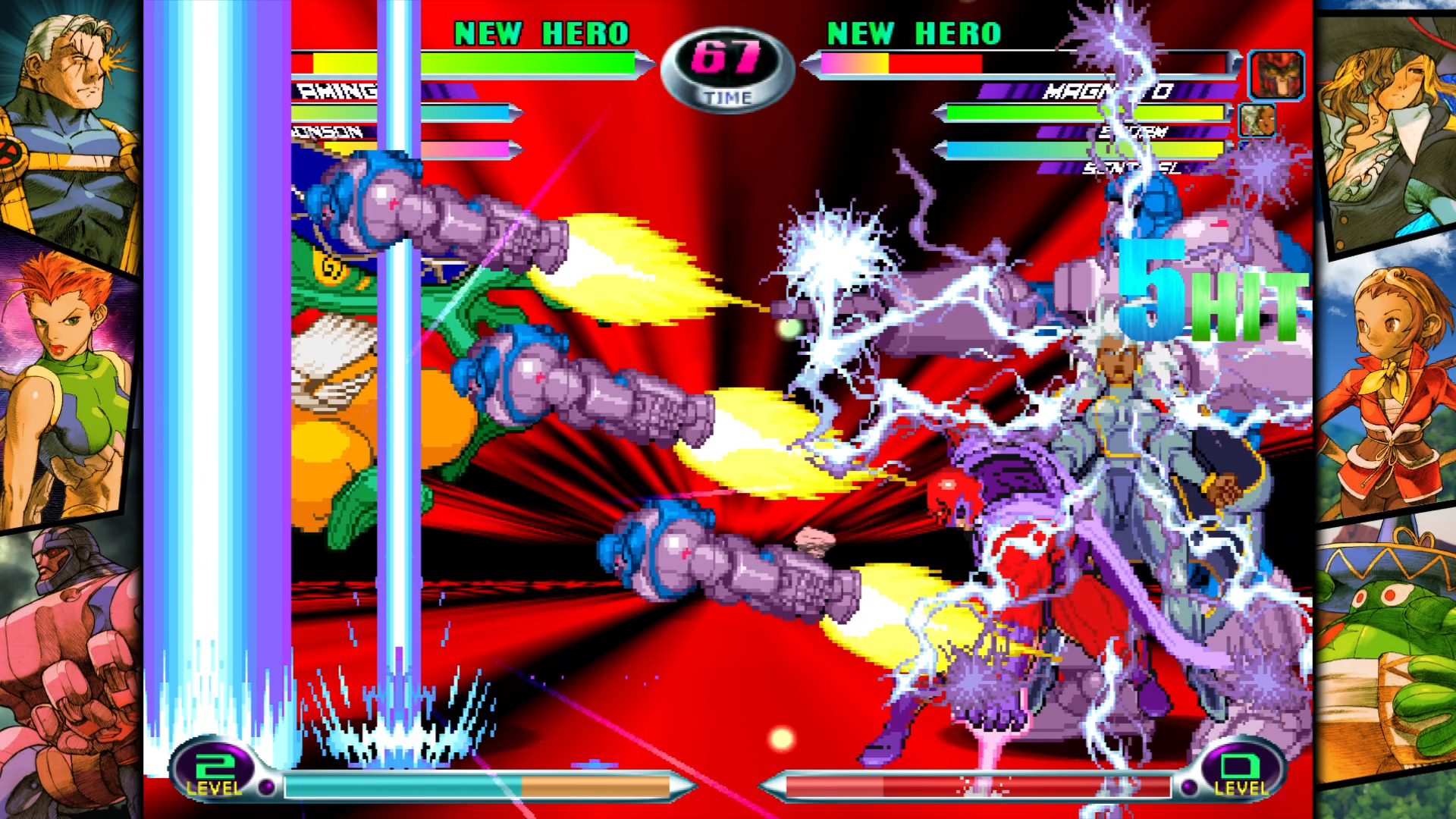
The centerpiece of the collection is unarguably Marvel vs. Capcom 2: New Age of Heroes. As one of the most well-documented and highly-requested fighting games to receive the port treatment, very little can be said about it that hasn’t been already. While it was infamously looked down on at the time of release by seasoned fighting game players, it’s since grown to become one of the most beloved games in the community for a number of reasons.
MvC 2 might be a favorite among fighting game pros, but it always had extremely strong casual appeal. It was the ultimate ‘who would win in a fight’ game years before guest characters were commonplace in the genre - and with its 3-vs-3 tag team setup and massive 56-character roster, there are countless opportunities for team synergy and dazzling combos.
Now, it is worth noting that MvC 2 is infamously, comically unbalanced. As mentioned earlier, there is a very clear set of top-tier characters that handily outclass the rest of the roster. At the highest level of play, it’s extremely common to run into teams featuring Cable, Sentinel, Magneto, or Storm largely thanks to their strong full-screen abilities. And as the game is true to its arcade version without any kind of balance changes, it’s something you’re bound to run into if you jump into online ranked play.
By no means is this a dealbreaker; I anticipate that a whole new audience of casual fans - be they modern Marvel heads or Capcom fanatics - will be mixing and matching their favorite characters on either side of the roster. Hopefully, this’ll lead to a thriving online scene for MvC 2 that hasn’t been seen since its now-delisted Xbox Live Arcade port.
Night at the museum
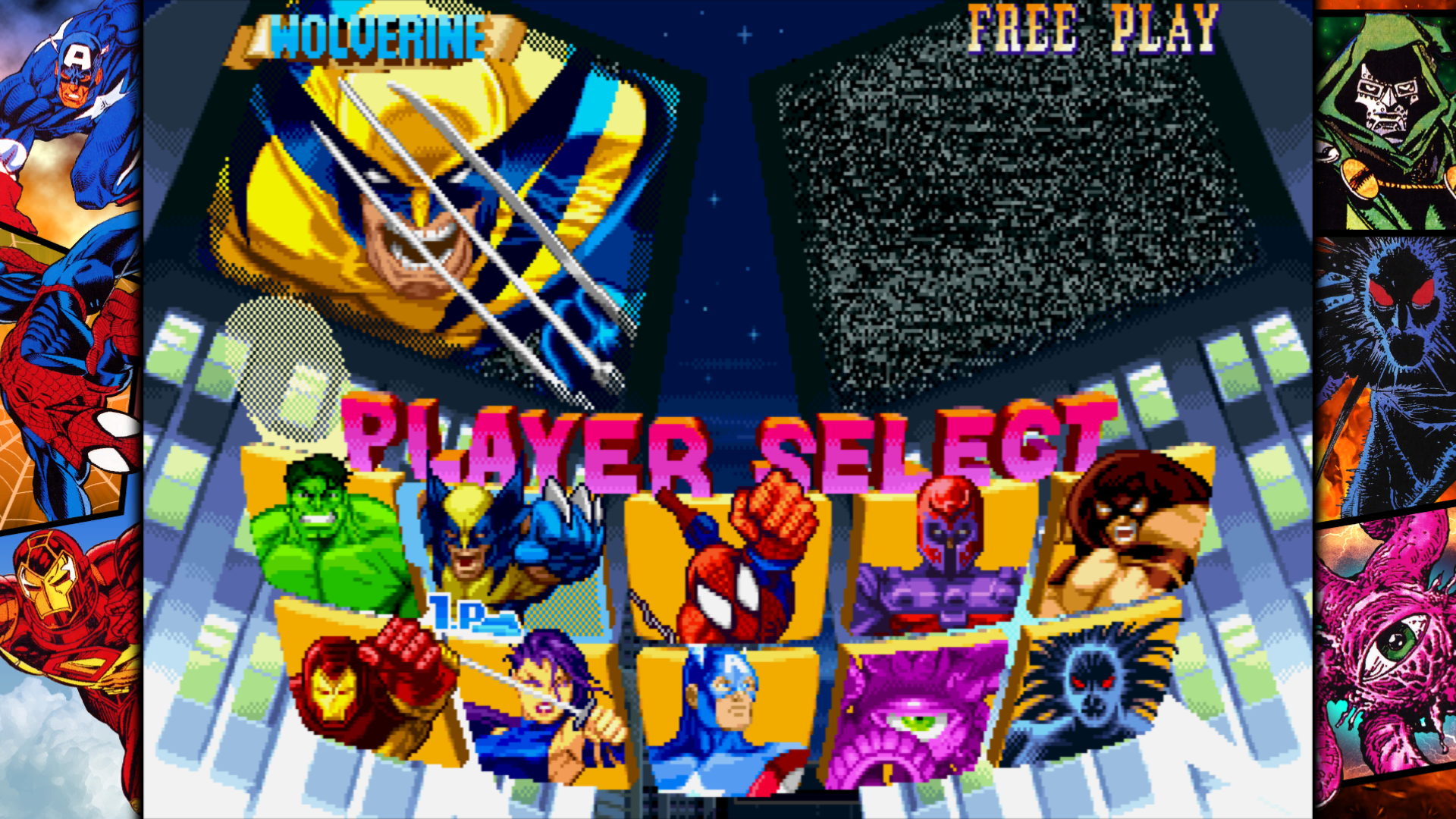
Marvel vs. Capcom Fighting Collection: Arcade Classics is a fantastic way to play these seven titles on modern hardware, but it’s also a great work of game preservation in itself. Each game has its own gallery of concept art, much of which has never been disclosed by Capcom before. It’s a fascinating trip down memory lane and provides superb insight into each game’s design. Full soundtracks are also available to listen to, which is always a nice bonus.
Other welcome extras include a range of display filters, side banners (though I prefer to play with these turned off), the choice to play English or Japanese versions of each game, and the ability to toggle the selection of secret characters. Furthermore, difficulty settings and the option to set one-button specials are perfect for casual players who just want to jump in for some solo arcade mode fun.
Lastly, each game features an authentic marquee card that’s accessible from the collection’s pause menu. These will give you insight into each character’s special moves as well as how to activate unique game mechanics. Full move lists and a brand new training mode can also be accessed if you really want to get stuck in and learn your favorite characters inside and out.
Accessibility
Marvel vs. Capcom Fighting Collection: Arcade Classics is light on dedicated accessibility features, but what’s here is welcome. An option for one-button specials is a highlight, removing the need for relatively complex button inputs. Controls are also fully remappable for each title, and a variety of display options lets you choose a filter and aspect ratio of your preference. The Versus games in particular are known for bombastic on-screen visuals effects, and thankfully, there is a light reduction setting to help minimize the intensity of some effects.
Should you play Marvel vs. Capcom Fighting Collection: Arcade Classics?
Play it if...
You want to know what all the fuss is about
Capcom’s Versus games are highly regarded, but it’s been impossible to play them on a readily available collection until now. If you’re a Marvel and/or Capcom fan who’s always been interested in checking out these landmark titles, this is an exceptional collection for you.
You want to pick up a new fighting game
There are six fighting games here that are going to draw in entirely new audiences for the first time in years. If you’re interested in learning a new fighting game with classic sensibilities, then this collection comes highly recommended.
You love diving into the history of games
The collection’s various galleries are packed with concept art and development tidbits that are utterly fascinating to peruse.
Don't play it if...
You’re after something more modern and balanced
These are older games that weren’t overly concerned with balance. If the idea of incredibly cheap team compositions or broken mechanics are irksome to you, then you might want to give this collection a miss.
How I reviewed Marvel vs. Capcom Fighting Collection: Arcade Classics
I played Marvel vs. Capcom Fighting Collection: Arcade Classics on PC for around 10 hours. That included arcade mode playthroughs of all titles, a full run of The Punisher beat ‘em up game, and a good bit of time perusing gallery mode and some time in training mode, too. I primarily used the Razer Wolverine V3 Pro controller for gameplay and the Razer BlackShark V2 X to enjoy the collection’s robust audio and soundtracks.
First reviewed September 2024

Rhys is TRG's Hardware Editor, and has been part of the TechRadar team for over four years. Particularly passionate about high-quality third-party controllers and headsets, Rhys strives to provide easy-to-read, informative coverage on gaming hardware of all kinds. As for the games themselves, Rhys is especially keen on fighting and racing games, as well as soulslikes and RPGs.
